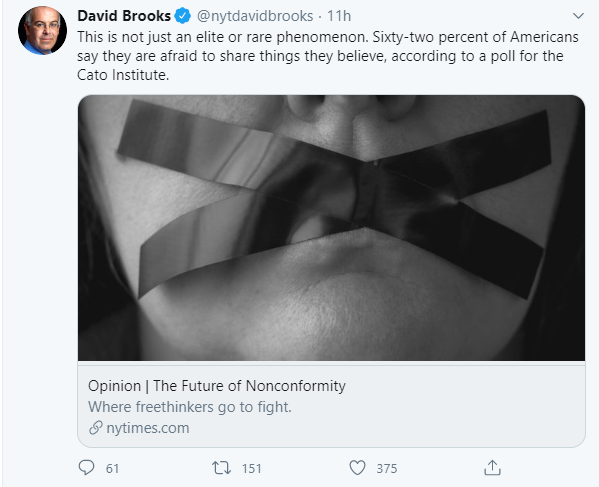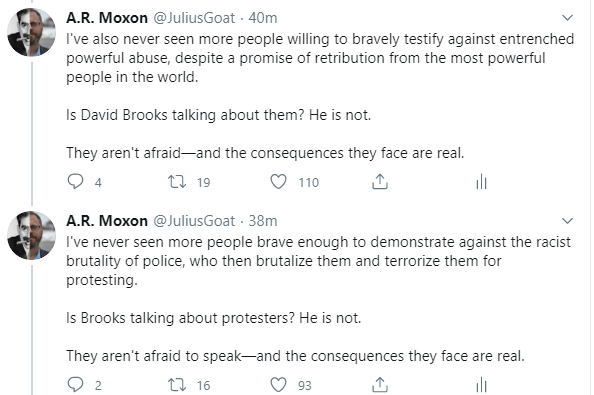I'm 45 years old, and I can't think of a time when bigots of all kinds felt more emboldened to speak their minds. I've never been more aware of how many people in my country believe horrible, selfish, anti-human things.
What is this America over which David Brooks obsesses?
What is this America over which David Brooks obsesses?
I've also never seen more people willing to bravely testify against entrenched powerful abuse, despite a promise of retribution from the most powerful people in the world.
Is David Brooks talking about them? He is not.
They aren't afraid—and the consequences they face are real.
Is David Brooks talking about them? He is not.
They aren't afraid—and the consequences they face are real.
I've never seen more people brave enough to demonstrate against the racist brutality of police, who then brutalize them and terrorize them for protesting.
Is Brooks talking about protesters? He is not.
They aren't afraid to speak—and the consequences they face are real.
Is Brooks talking about protesters? He is not.
They aren't afraid to speak—and the consequences they face are real.
It's not fear to say what's on your mind, it's fear to be understood as the type of person who says those things.
Once again, the worst thing Trump supporters can imagine is being known for what they are.
The worst offense they can imagine is accurate criticism.
Once again, the worst thing Trump supporters can imagine is being known for what they are.
The worst offense they can imagine is accurate criticism.
The thing I notice about all of these "cancel culture" columns is they make no attempt to assess the value of what people are afraid to say, or what consequence people are afraid of.
They treat all statements as equally valuable, all threats as equally severe.
That's by design.
They treat all statements as equally valuable, all threats as equally severe.
That's by design.
Some people are afraid to say "I'm gay," or "I'm a man" or "I'm a woman" because if they do they'll be subjected to empowered harassment, danger, expulsion, violence and death.
Some people are "afraid" to say "I hate gay people," because then they'll be understood as hateful.
Some people are "afraid" to say "I hate gay people," because then they'll be understood as hateful.
I find it extraordinary that in the age of Trump and Kavanaugh there are people whose chief worry seems to be that people are afraid to speak their minds because of consequence.
Or that in the age of Blasey Ford and Vindman, the consequences for speaking are equal.
Or that in the age of Blasey Ford and Vindman, the consequences for speaking are equal.
Say whatever you want to say, you will be understood as the sort of person that says that, and people might at some point say what they think about you. If you can live with that, you can say anything.
That’s *more* speech, not less.
That’s *more* speech, not less.
Say, "I'm gay" if you are; everyone will understand you to be a gay person.
Say "I won't bake a cake for that gay wedding," if you like; everyone will understand that you hate gay people.
Explain you don't hate gay people, if you like—but that cake thing will come back up.
Say "I won't bake a cake for that gay wedding," if you like; everyone will understand that you hate gay people.
Explain you don't hate gay people, if you like—but that cake thing will come back up.
If you don't like the consequence of saying "I won't bake a gay cake," I really don't know what to tell you.
Imagine saying "I'm gay" and knowing the consequence is that millions of people won't even want you to exist.
Which speech is more brave? Which more constrained?
Imagine saying "I'm gay" and knowing the consequence is that millions of people won't even want you to exist.
Which speech is more brave? Which more constrained?
I don't know if you should be *afraid* to face the consequence of saying "I won't bake a gay cake," but you should expect it.
But the person saying "I'm gay" *should* fear the very real consequence of anti-gay hate—and it shouldn't be thus. So I think what I think about you.
But the person saying "I'm gay" *should* fear the very real consequence of anti-gay hate—and it shouldn't be thus. So I think what I think about you.
I've heard what America thinks. We have crowds in red hats eager to tell us, and crowds more eager to appease them.
I'd say at least 62% of us *should* think twice about what we think, and how what we say speaks clearly about us.
Speak if you like—but prepare to be understood.
I'd say at least 62% of us *should* think twice about what we think, and how what we say speaks clearly about us.
Speak if you like—but prepare to be understood.
I usually let my imprecisions on Twitter slide, but I do want to clarify the final paragraphs of these two posts: It's not that they aren't afraid to speak, but that they speak despite the valid fear of the real consequence, because they believe in what they say.
I'd encourage conservatives "afraid" to speak their minds this advice:
Be braver. Try courage.
The idea of there being consequences for saying things you believe is only new to YOU.
There's more speech now. Not less.
Be braver. Try courage.
The idea of there being consequences for saying things you believe is only new to YOU.
There's more speech now. Not less.
Just try a little courage.
Give a little more thought before you speak, and be willing to own what you say. Have the conviction to speak what you believe, and accept the consequence.
Speak all you want. Prepare to be understood.
Give a little more thought before you speak, and be willing to own what you say. Have the conviction to speak what you believe, and accept the consequence.
Speak all you want. Prepare to be understood.
There’s never been a time people couldn’t get fired for having an opinion. What’s changed is what opinions, and who feels the threat.
Women get fired for the opinion “my boss can’t grope me.”
Now bosses sometimes are fired for the opinion “sure I can.”
https://twitter.com/tomfinnell/status/1286682511792320513?s=21 https://twitter.com/tomfinnell/status/1286682511792320513
Women get fired for the opinion “my boss can’t grope me.”
Now bosses sometimes are fired for the opinion “sure I can.”
https://twitter.com/tomfinnell/status/1286682511792320513?s=21 https://twitter.com/tomfinnell/status/1286682511792320513
Meanwhile people still *can* have a conversation, whether reasonable or not, about anything those two people want to talk about.
Only if their topic is whether or not a third party should be allowed to exist, that third party might have something to say about it.
Only if their topic is whether or not a third party should be allowed to exist, that third party might have something to say about it.
The problem with this formulation is, in short, reality.
The left didn’t elect an authoritarian president, or send federal troops into US cities. The left isn’t abducting moderate conservatives into vans. The left doesn’t cheer police brutality.
https://twitter.com/josephwrio/status/1286747798025707527?s=21 https://twitter.com/josephwrio/status/1286747798025707527
The left didn’t elect an authoritarian president, or send federal troops into US cities. The left isn’t abducting moderate conservatives into vans. The left doesn’t cheer police brutality.
https://twitter.com/josephwrio/status/1286747798025707527?s=21 https://twitter.com/josephwrio/status/1286747798025707527
Making this about "people I disagree with" is a common critique against this thread. It's a canard.
The dialectic is empowered abuse.
Critics of this thread don't want to discuss empowered abuse, so they make it about a philosophical disagreement. https://twitter.com/VaclavHavel9/status/1286688745148751874?s=20
The dialectic is empowered abuse.
Critics of this thread don't want to discuss empowered abuse, so they make it about a philosophical disagreement. https://twitter.com/VaclavHavel9/status/1286688745148751874?s=20
I do think it is bad when marginalized people fear speaking their mind about existing as equal humans worthy of dignity because of the threat of empowered abuse.
And think it's good when empowered people face the natural consequence of using their power to abuse others.
And think it's good when empowered people face the natural consequence of using their power to abuse others.
That consequence doesn't represent impingement upon free speech, but upon empowered impunity.
But whether I agree or not is immaterial. Your response to my speech is a part of speech. As is my response to you.
Speak your beliefs. Prepare to be understood.
But whether I agree or not is immaterial. Your response to my speech is a part of speech. As is my response to you.
Speak your beliefs. Prepare to be understood.
I woke up to a string of invective in my DMs because my words were correctly understood to be hostile to transphobia.
My mentions make it clear that a lot of T*rfs have read my words and drawn the same conclusion, and are very angry about it.
They've understood me very well.
My mentions make it clear that a lot of T*rfs have read my words and drawn the same conclusion, and are very angry about it.
They've understood me very well.
The invective is a part of the consequence of being understood, and not a particularly pleasant one. But I'm not afraid to speak my mind as a result. I'm not being silenced, nor are the t*rfs--because we're in privileged positions.
Trans women face consequences far more dire.
Trans women face consequences far more dire.
Now, I write t*rf because my understanding is that there have been accounts in the past suspended for using the full term, because of t*rf mass reports.
Perhaps so. And so perhaps my writing t*rf does represent a minor silencing.
But trans people face far more severe silencing.
Perhaps so. And so perhaps my writing t*rf does represent a minor silencing.
But trans people face far more severe silencing.
I think if I wrote a piece centering the issue of anti-trans silencing around my choice to write t*rf to avoid a perceived anti-speech consequence, I'd look like a bit of a self-centered jackass.
For me, it's a Twitter account. For marginalized people, this is life or death.
For me, it's a Twitter account. For marginalized people, this is life or death.
It's very important to watch where the power actually is.
The dialectic is empowered abuse, and people can take their sides how they like. Only you should be prepared to be understood as the sort of person who takes the side you take.
The dialectic is empowered abuse, and people can take their sides how they like. Only you should be prepared to be understood as the sort of person who takes the side you take.
When people complain about “cancel culture” chilling free speech in our schools, they never ever mean this.
https://twitter.com/mkonnikova/status/1291736271119949825?s=21 https://twitter.com/mkonnikova/status/1291736271119949825
https://twitter.com/mkonnikova/status/1291736271119949825?s=21 https://twitter.com/mkonnikova/status/1291736271119949825

 Read on Twitter
Read on Twitter



